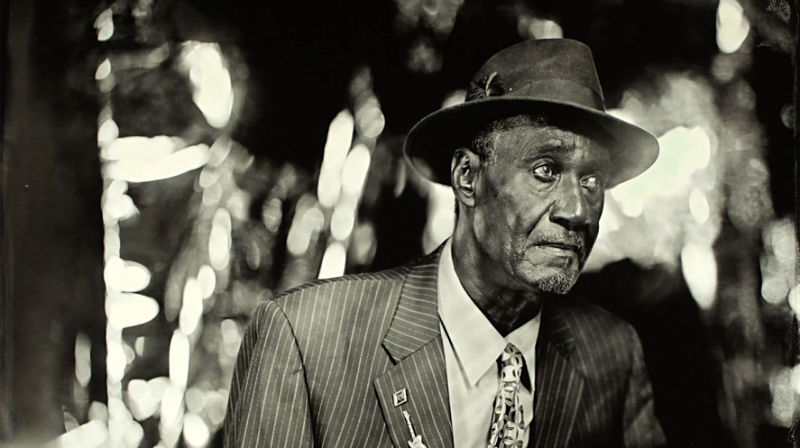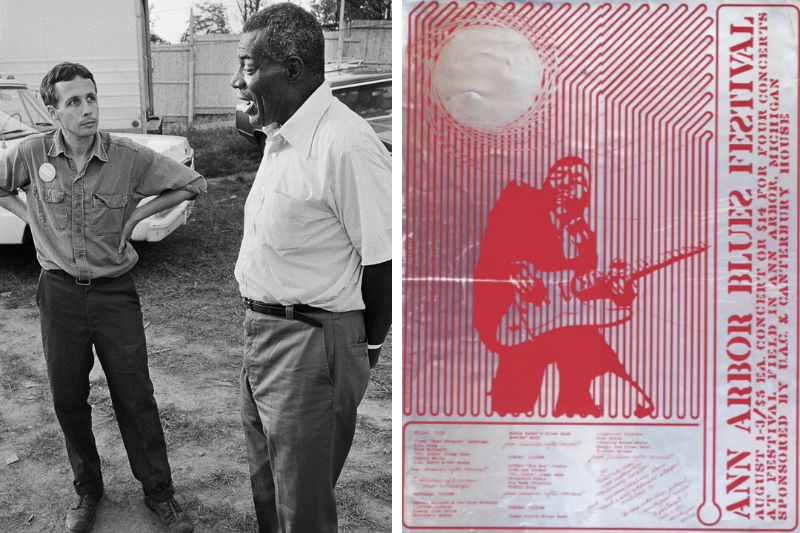Come Together: A2 Jazz Fest will showcase the region's rich talent

Although the Ann Arbor/Ypsilanti area is certainly home to many talented jazz musicians, sometimes it might seem that they fly a little under the radar. The A2 Jazz Fest is out to change that.
The free admission, two-day festival returns for its second edition Friday and Saturday, September 8 and 9. Friday evening’s venue is the First Congregational Church, while on Saturday the festival takes over LIVE nightclub. (This is a change from the initially announced location at the Ann Arbor Distilling Co.)
“Currently jazz is featured at a number of restaurants and bars, once or twice a week, but there is no longer a dedicated jazz club in Ann Arbor or Ypsilanti," says Dave Sharp, local bassist, bandleader, and organizer of the A2 Jazz Fest. "UMS and the Kerrytown Concert House certainly feature amazing jazz groups, but not on the scale or frequency of a jazz club or jazz festival."
UMS's season starts with Butler, Bernstein & The Hot 9's new spin on New Orleans jazz

New York meets New Orleans in Ann Arbor on Friday, Sept. 8, as Butler, Bernstein & The Hot 9 bring their unique twist on classic jazz to a special concert at Downtown Home & Garden/Bill's Beer Garden.
The show, which opens the new season of the University Musical Society, continues a successful partnership of the great New Orleans pianist and singer Henry Butler with Steven Bernstein, the accomplished New York trumpeter and bandleader known for working in a number of different styles with various ensembles.
Joe Hertler & The Rainbow Seekers concluded Sonic Lunch with summer vibes

The 2017 season of the Sonic Lunch free concert series wrapped up Thursday with Joe Hertler & The Rainbow Seekers playing to an appreciative crowd.
Over its 10-year history, Sonic Lunch has become a key part of summer in Ann Arbor, and the band provided a laid-back, seasonally appropriate sound, blending jam-band rock and neo-soul with accents of ’70s pop and funk.
Tools Crew Live: Mark Kirschenmann & Adam Shead
Downloads:
➥ MP3 for "Behind the Sky"
➥ 720p video
Tools Crew Live is an ongoing video series where we invite artists to perform with gear borrowed from the Ann Arbor District Library's Music Tools collection: aadl.org/musictools.
The most common use for effects pedals in AADL's collection is to change the sound of electric instruments, such as guitars and keyboards -- not acoustic gear, such as trumpets and drums. But there's nothing common about the music of Mark Kirschenmann, PhD. He's been experimenting with changing the tone of his trumpet through electronics since the '70s after he heard Miles Davis' electro-jazz-funk classic On the Corner.
Kirschenmann is a U-M lecturer of jazz and contemporary improvisation, and he also leads the music school's Creative Arts Orchestra, which includes drummer Adam Shead, a grad student at U-M studying "cultural memory, tradition, and narrative in improvised music communities." Shead augments his standard drum setup with electronics and straight-up knick-knacks, such as a dishtowel or his wallet, so he can explore different tonalities on his kit.
Together, Kirschenmann and Shead combine their extended techniques -- such as playing the trumpet without a mouthpiece or putting a leg on the snare drum -- to create an improvised universe of sound.
We talked to the duo about why they began applying electronic effects to their acoustic instruments, Kirschenmann's use of AADL music tools in his classes, and the stories behind the two songs they recorded for us in the library's Secret Lab on April 20, 2017.
Nature's Way: Chris Bathgate's "Dizzy Seas" is simultaneously ethereal and earthy

The release of a new Chris Bathgate album is a major occasion for fans of great songwriting and enticing sounds -- especially in Michigan, where he has strong ties.
He released the Old Factory EP last year, but this spring’s Dizzy Seas is Bathgate’s first full-length album since 2011’s acclaimed Salt Year. (All came out on the Ann Arbor-based Quite Scientific label.) The songs on Dizzy Seas are as strong as ever, presented in a sound that’s simultaneously rich and stripped down. And although Bathgate now lives in California, Michigan has definitely left an impression.
He agreed to answer a few questions via email about the new record, the themes of his songs, and Michigan music.
Joshua Davis showcased new songs and old favorites at Sonic Lunch

Joshua Davis keeps getting better.
Thursday’s Sonic Lunch show by the longtime Michigan singer-songwriter mixed some old favorites, some cool covers, and some songs from his upcoming album, The Way Back Home. And while the music was great throughout, the new songs were the ones that really stood out.
The musicianship was impeccable. Davis’ guitar playing has become more ambitious over the years, and he handled several intricate solos with aplomb. And, following his successful run on The Voice a couple years back, his singing seems deeper and richer.
Death-Dodger Rocker: Alejandro Escovedo at The Ark

It's been a rough few decades for Alejandro Escovedo, but at age 66 the musician seems to be enjoying a new lease on life. Born to Mexican immigrants in Texas, Escovedo cut his teeth in the punk band The Nuns and blended in rootsier influences with his later bands Rank and File and The True Believers. He embarked on a solo career in the '90s, winning the auspicious designation "Artist of the Decade" from roots and country music magazine No Depression in 1998. But behind the scenes of that professional achievement, Escovedo had only begun a prolonged personal battle. He was diagnosed with hepatitis C in 1996, and a combination of financial troubles and negative reactions to traditional treatment caused him to struggle with the disease for nearly 20 years.
Escovedo collapsed onstage in 2003, which led him to seek non-traditional treatment for his condition. He was finally cured of hepatitis in 2015 -- but not before he and his new wife, Nancy Rankin Escovedo, underwent a different kind of harrowing experience. Hurricane Odile struck during the couple's 2014 honeymoon in Mexico, tearing off the front of the beachfront home they were staying in. Both the Escovedos were diagnosed with PTSD following the experience.
In the wake of all this hardship, however, Alejandro Escovedo has experienced considerable rejuvenation both personally and creatively. Last year he released Burn Something Beautiful, a new album co-written with former R.E.M. guitarist Peter Buck and Scott McCaughey, frontman of The Minus 5 and The Young Fresh Fellows (and a regular R.E.M. collaborator). As with Escovedo himself, the scrappy, hooky record has far more energy than anyone might expect of the average senior citizen.
Escovedo will play The Ark on Wednesday, August 23, sharing the stage and swapping songs and stories with fellow Texas rocker Joe Ely. We caught up with Escovedo while he was visiting Austin, where he lived for over three decades before a recent move to Dallas.
Slow Burner: Alabama Slim at the Ann Arbor Blues Festival

In addition to the impossible-to-replicate lineup, the real legacy of the original 1969 Ann Arbor Blues Festival is in how a group of college students helped introduce mainstream, white America to the incredible music being overlooked all around it for years in favor of repackaged versions from the U.K.
If there's such a secret hiding in plain sight at this year's revived Ann Arbor Blues Festival, it's probably Alabama Slim. Born Milton Frazier in Vance, Alabama, Slim didn't record an album until he was in his 60s, when he finally teamed up with his cousin, fellow New Orleans guitarist Little Freddie King (not to be confused with the late Chicago guitar great Freddie King) to record The Mighty Flood for the Music Maker Relief Foundation.
Slim's a first-rate storyteller, whose warm baritone voice and tasteful, hypnotic playing recall all-time greats, like Muddy Waters or John Lee Hooker on a slow burner.
We talked to Slim briefly by phone on the eve of a family reunion in Birmingham, Alabama, where he was looking forward to some good food, drinking a couple of beers, and relaxing after a long drive.
Resurrected: James Partridge on the 2017 Ann Arbor Blues Festival

As an East Coast transplant and late-comer to the blues, you can forgive James Partridge for not knowing Ann Arbor's storied history with the world's greatest blues musicians until fairly recently (or exactly blame him -- there's no Beale Street or other marker to speak of).
But as founder of the recently formed Ann Arbor Blues Society and co-organizer behind the return of the Ann Arbor Blues Festival, which takes place Saturday, August 19, at Washtenaw Farm Council Fairgrounds, he's making up for lost time quickly.
Put a Spell on You: Michael Erlewine on the 1969 Ann Arbor Blues Festival

During the early folk revival of the pre-Bob Dylan 1960s, music historian and author Michael Erlewine says fans were more interested in finding the most authentic form of the music than the next great songwriter. Conserving a dying art form was the priority at gatherings like the Newport Folk Festival.
So when music heads turned their attention to the electric blues, which was largely ignored on the folk circuit, they had the same impulse. But they soon learned it was misguided.
"We wanted to revive it -- to preserve it, protect it, and save it," Erlewine says. "But to our huge surprise, it wasn't dead. It didn't need reviving. It was just playing across town behind a racial curtain of some kind. To find what we thought was a dying music was very much alive, it was just another whole world for us."
In August 1969, a group of University of Michigan students led by organizers Cary Gordon and John Fishel, brought that world home to Ann Arbor with the first ever Ann Arbor Blues Festival.
As founders of the town's resident blues band, The Prime Movers -- which eventually featured drummer Iggy Pop --
and avid students of Chicago blues, Erlewine and his brother Daniel Erlewine were enlisted to help track down and care for the talent.
And there was so much talent: B.B. King, Mississippi Fred McDowell, Muddy Waters, Magic Sam, Big Mama Thornton, Son House. The list goes on. Nearly 20,000 people are estimated to have witnessed that first-of-its-kind gathering at the Fuller Flatlands near U-M's North Campus.
With another Ann Arbor Blues Festival reboot coming on Saturday, August 19, at the Washtenaw County Fairgrounds, it seemed like a good time to check in with Erlewine, who went on to found the All-Music Guide and edit several books on blues and jazz. His 2010 book with photographer Stanley Livingston, Blues in Black and White, is an excellent, loving tribute to the original blues festivals in pictures and prose.
Erlewine talked with us by phone from his home in Big Rapids about the heady days of those early fests, tripping out on Howlin' Wolf's massive voice, and drinking early into the morning with Arthur "Big Boy" Crudup and Big Mama Thornton.


































